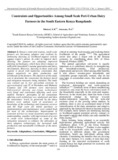| dc.description.abstract | In Kenya’s semi-arid regions, small scale farmers are becoming adaptive and resilient by embracing dairying as livelihood-support activity against expert’s advice. In order to improve their dairying, the farmers are adopting improved dairying technologies, which have direct impact on milk yield, household’s income generation and dairy development. However, dairying in these semi-arid regions is faced with numerous constraints that impact negatively on dairy production and livelihoods of the farmers. The objective of this study was to determine the constraints the farmers faced and mitigation measures being initiated. The study was carried out in two peri-urban environs in agro-ecological zone IV in Machakos and Makueni Counties and 150 farmers were interviewed. Self-practiced dairying and forage technologies were listed and constraints affecting each were studied. Farmers’ perception of the constraints affecting each technology was analysized and then the constraints’ levels as perceived by the dairy farmers were ranked. Lack of awareness or knowledge of the technology and extension services and the high costs for initial purchase or implementation and maintenance were ranked high for most of the technologies. Improvement of extension services to create awareness and improve understanding, together with improvement of access to credit were acknowledged as some of the mitigation measures to enhance the utilization of these adaptive technologies for increased milk production and sustainable livelihoods of the dairy farmers. | en_US |

